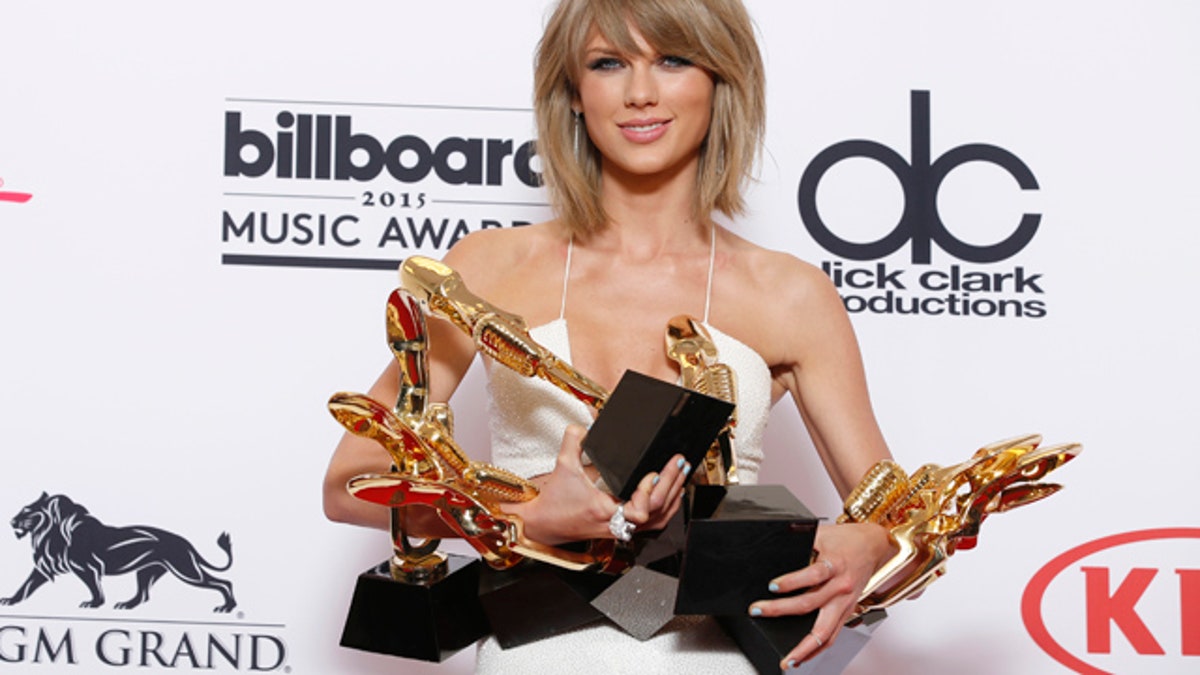
FILE - In a May 17, 2015 file photo, Taylor Swift poses in the press room with the awards for top Billboard 200 album for '1989', top female artist, chart achievement, top artist, top Billboard 200 artist, top hot 100 artist, top digital song artist, and top streaming song (video) for 'Shake It Off' at the Billboard Music Awards at the MGM Grand Garden Arena, in Las Vegas. (Photo by Eric Jamison/Invision/AP, File)
PALO ALTO, Calif. – Taylor Swift has Apple changing its tune.
Hours after the pop superstar criticized the giant tech company in an open letter posted online, Apple announced Sunday that it will pay royalties to artists and record labels for music played during a free, three-month trial of its new streaming music service.
"When I woke up this morning and I saw Taylor's note that she had written, it really solidified that we needed to make a change," said Apple senior vice president Eddy Cue in an interview with The Associated Press.
Apple had already agreed to share revenue from paid subscriptions to the new Apple Music service, which will cost $10 a month. But Swift said she would withhold her latest album from the service because Apple wasn't planning to pay artists and labels directly for the use of their music during the free, introductory period.
"We don't ask you for free iPhones. Please don't ask us to provide you with our music for no compensation," Swift wrote in an open letter posted Sunday on her Tumblr page, under the heading "To Apple, Love Taylor. "
Apple has maintained that it negotiated revenue-sharing at rates that are slightly higher than the industry standard, to compensate for the three months that it plans to offer its streaming service without charge.
"We had factored that in," Cue said Sunday. But he added, "We had been hearing from artists that this was going to be rough on them, so we are making this change."
Cue declined to say how much Apple will pay in royalties for streaming during the free trial period. He said Apple will share 71.5 percent of its revenue from paid subscriptions within the United States and 73 percent from subscriptions outside the country, while other streaming services generally share about 70 percent.
Some artists and independent labels had worried they would miss out on opportunities to get a financial return from new music that is released during the three-month trial. Swift said she spoke out on their behalf.
Swift wasn't immediately available for comment on Apple's change of heart. But she posted a reaction on Twitter late Sunday, saying "I am elated and relieved. Thank you for your words of support today. They listened to us."
Cue wouldn't comment on whether she will now make her album "1989" available on Apple Music. But he said he spoke with Swift personally on Sunday. "She was very pleased to see that we would give her a call right away and have a discussion," he said.
Since Apple began selling digital music through its iTunes store in 2001, he added, "We've always loved music and have strived to make sure that artists are getting paid for their work."
Swift had written in her letter that she found Apple's original stance to be "shocking, disappointing, and completely unlike this historically progressive and generous company."
While praising Apple for developing a paid music service that will compensate artists, she added, "We know that this incredible company has the money to pay artists, writers and producers for the 3 month trial period."
The singer and songwriter has been outspoken on the issue of compensating musicians for streaming music. Last year, Swift pulled her catalog of recordings from Spotify after complaining about its use of her music on the free, ad-supported version of its service.






